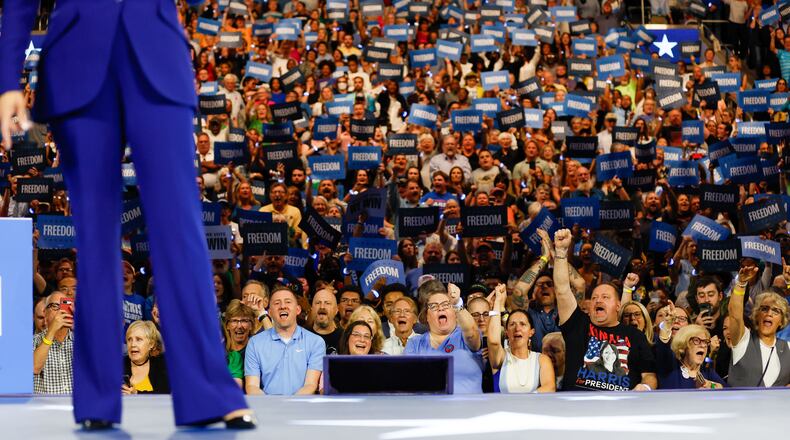Georgia has never elected a female governor nor a female senator. And about one-fifth of Georgia voters don’t want to elect a woman president, either.
We know that because the latest AJC poll asked likely Georgia voters whether having a female president would be good for the country or bad for the country. Nearly 20% of Georgia voters, equally divided between men and women, said that electing a woman president would be bad for the republic. The question wasn’t about Kamala Harris as president, but about a woman generically.
I have to admit I was surprised by that result. Do they not think a woman is strong enough to be president? Presidential enough? Man enough? We’ve got four female Supreme Court justices and a female vice president. Other countries, such as Germany and Britain, had strong female leaders long ago.
I’ve heard plenty of people over the years say they don’t think the country is “ready” to have a woman president. And a lot of times that means the person talking isn’t ready to see a woman leading the country.
I figured that out in 2012 at a rally in Iowa for GOP Minnesota Congresswoman Michelle Bachmann, who was running for president at the time. I talked to several women there who loved Bachmann, but they still weren’t planning to vote for her.
“I just started thinking about being ‘presidential,’ and I don’t know that we’re ready for a woman for president,” a woman named Jeanne told me then. “I think what we really need to do is get Rick Santorum for president and Michele Bachmann for vice president.”
More than a decade later, that thinking persists. Republican voters have long been less likely than Democrats to support the idea of a woman for president, and there was a huge partisan split in the AJC poll we conducted this month, too. Just 6% of Republicans said having a woman president would be good for the country, while 34% said it would be downright bad for the country. Compare that with 71% of Democrats, who said the country would benefit from a female chief executive, and just 3% who said it would be bad.
I reached out to several respondents from our poll to hear more about their objections to a lady leader.
Glenda in Fayette County said she considers herself a conservative first, and a Republican second. She voted for Trump in 2016 and 2020 and is planning to do it again.
“I don’t think the country is ready for a female president. I especially don’t think that they are ready for a female that Kamala Harris represents,” she said. “I’m a female, so I’m saying that with eyes wide open.”
Harris does not represent any of the women Glenda knows, she said. “She represents an extreme, almost ideological perception of who she is and what she’s entitled to, simply because she is a female.”
From abortion rights to foreign policy to public safety, Glenda said she disagrees with Harris on nearly every issue she can think of. One female leader Glenda did like was German Chancellor Angela Merkel. “But I don’t think this country is ready for it, period,” she said.
Brenda, a Republican in Forsyth County, also voted twice for Trump and will again in 2024. Immigration is her top issue.
“I don’t think Kamala Harris is the right woman,” she said. “Do I believe there is a woman out there that could handle the job? I do. I just don’t think she’s it. I think she’s kind of stupid.”
You don’t have to look far to find plenty of Democrats who have been ready to elect a woman president since Hillary Rodham Clinton ran in 2008 and are more than ready to elect Harris now. But the vice president almost never talks about the “first” she would be if she wins in November. And she absolutely never says someone should vote for her because of the history she would make.
Instead of talking about glass ceilings and making history, as Clinton did in both of her presidential campaigns, the imagery and language of Harris’ campaign has almost nothing to do with gender and everything to do with power.
During her recent debate against Trump, she spoke in detail about her background as a prosecutor and detailed the weapons systems the U.S. military uses in overseas conflicts. Her convention speech a month before that included a promise to always ensure America has “the most lethal fighting force in the world.”
And even when a sea of female delegates wore suffragette white on the night she became the Democratic nominee, Harris wore black.
Part of that may be because Harris is in the second generation of female leaders in Washington who have been more focused on making policy than on making history. She was the third female senator from California, not the first. And she’s the second woman to get the Democratic nomination for president. Hillary Rodham Clinton made that piece of history in 2016.
But the Harris campaign also knows what the AJC poll and others like it show. A significant portion of voters may say it would be bad for the country to have a woman president, but an even larger share, including a majority of Republicans, say it would not matter one way or another whether the next president is a man or a woman.
Ironically, that last statistic — that a candidate’s gender isn’t really a factor for a plurality of voters — may be proof of real progress on the issue after all.
Whether Harris wins or loses in November, the lion’s share of voters will have chosen her based on the content of her campaign, not on the history they’d make by putting her in the Oval Office.
About the Author
Keep Reading
The Latest
Featured


